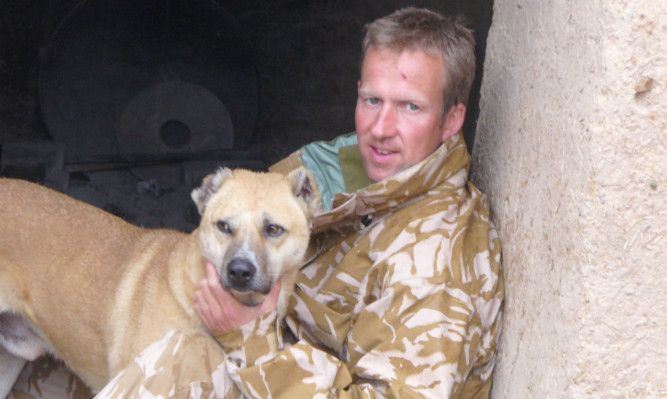
Serving with the Royal Marines in Afghanistan, self-preservation rather than animal welfare was uppermost in Pen Farthing’s mind.
But that all changed when he was out on patrol one day with his men.
“We were out in Helmand province, in a town called Nowzad,” he said.
“At the back of our compound, the Afghan police were holding a dogfight.
“There was a circle of policemen and Afghan soldiers with two dogs in the middle, and they were making them fight.”
Appalled at what he saw, Pen decided to intervene, even though dogfighting is widely accepted in Afghanistan.
“We broke up the fight and one of the dogs ran back into our compound.
“They were holding the fight outside our compound, so they’d breached security by going outside without telling anybody.
“We realised we couldn’t interfere on the grounds of culture, so we played the security card instead.
“We didn’t let them know that one of the dogs had sneaked in and we were looking after it.”
Over the next few months, Pen befriended the dog and the pair became inseparable.
“People deal with the stresses of being out in Afghanistan in different ways some read books or write letters home others get hold of old mortar cases and carve them into cups,” he revealed.
“My five minutes of chilling out was spent with the dogs.”
“The military have made it clear that they disapprove of looking after stray dogs because of disease, but we were so far out that we didn’t have much contact with higher command.”
Although Pen knew military regulations wouldn’t permit him to bring the dog home he called it Nowzad after the town Pen decided to make his own arrangements to get the animal back to Britain.
It led to him setting up a charity to help tackle the problem of stray dogs in Afghanistan and to help other servicemen who face being separated from dogs they’ve adopted.
“We’ve now helped 550 servicemen from around the world to adopt the cats or dogs they’ve befriended on the Front Line in Afghanistan,” he said.
“We now run the only animal shelter in Afghanistan, with a fully-functioning clinic in Kabul where we have two vets we’ve trained from scratch.”
As you’d expect being run by a former soldier, it’s a well-oiled machine.
“Once someone gets in touch, the dogs come to the clinic and are vaccinated and get a health check, before waiting in the shelter while we raise the funds to get them out to where the soldier and his family are,” Pen explained.
“Sometimes, we send a driver to collect the animal, and sometimes a soldier will pay someone to deliver a dog to us.”
Pen and his colleagues are helping change attitudes in Afghanistan.
“Before the Taliban, people had dogs as pets, so now we offer a rehoming service to Afghan nationals as well,” he revealed.
“When stray dogs come in, we neuter them and vaccinate them, and Afghan nationals come in to us looking for a dog as a pet.
“Because we’re actively doing something about what is a big stray dog problem, we’re getting quite a bit of support from the locals.
“In turn, it will have an effect on the dogfighting, because there won’t be so many animals available to be used.”
At his West Country home, Pen, who still makes regular trips to Afghanistan, has found space for a total of four dogs.
“As well as the first two I brought out, there’s a big dog called Patch, who’s an Afghan Kuchi, and one called Max, who came from Baghdad.
“Patch was a puppy, and we wanted him as a charity mascot, but we didn’t realise how big he was going to be.
“He’s now four years old and the size of a small horse!”
For more information about the work of Nowzad, go to www.nowzad.com or write to PO Box 39, Plymouth, PL2 9AU.

Enjoy the convenience of having The Sunday Post delivered as a digital ePaper straight to your smartphone, tablet or computer.
Subscribe for only £5.49 a month and enjoy all the benefits of the printed paper as a digital replica.
Subscribe